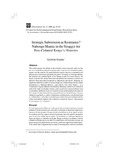| dc.description.abstract | This article pursues the debate on the role that various regional leaders in late
pre- to colonial Kenya played in their people’s responses to colonialism and its
agents, and the contests for moral historical spaces that have continued to be
played out in intellectual and public discourse. Focusing on Nabongo Mumia,
the political and cultural figure of the Wanga people in western Kenya, the
article examines the fluidity between collaboration and resistance as processes
that have been presented mistakenly as dialectical oppositions. Situating my
argument within the counter-revisionist trajectory, I demonstrate that the earlier
presentation of Nabongo Mumia – and indeed a few other leaders – as a
‘collaborator’ largely simplifies the dilemmas that many a leader were confronted
with in the wake of colonial violence, and is used in the current political setup
to rationalise deliberate forms of exclusion from central political structures in
the country. I further show that for regional leaders in colonial Kenya, strategic
submission guided by a variety of legitimate considerations, was often misread
as ‘collaboration’, a line that was picked up by earlier Africanist inclined scholars
whose nationalistic impulses drove them to a search for ‘heroes’, often guided
by the matrices of ‘resistance | |

